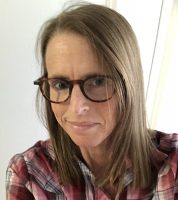Amy’s Story

I considered several options for graduate study in social work, but I had an epiphany fairly early in my application process. Instead of asking me how I might fit into their social work program, the School of Social Work at the University of Maine wanted to know about my life and learn what had led to my interest in pursuing graduate
studies in social work. When I walked into the administrative office of the School of Social Work for the first time, the authenticity of the application process was further revealed. The walls were lined with photographs of graduating cohorts from years past, and I felt this spoke volumes about the focus of the program.
During the past two years, I have had the opportunity to complete fieldwork in my areas of interest. My first placement was with the Restorative Justice Project Maine, and for my advanced field placement, I have been working with individuals, communities, and systems involved with and impacted by the criminal justice system, while also exploring ways to promote community reentry support. My daily work with individuals, families, and communities has led to many insights about the criminal justice system and the unmet needs of those impacted not only by incarceration but by social, economic, racial, and environmental factors that culminate in arrest, conviction, sentencing, and challenges with post-release adjustment. I have learned the true value of listening and better recognize the importance of making time to authentically engage with others. I understand the importance of meeting people where they are and learning from their lived experiences. For me, social work is about providing support and working with individuals to encourage them to discover their own strengths, resilience, and capabilities. I will graduate in May, but my process of discovery is far from complete. I consider learning to be a life-long journey of expanding my awareness, knowledge, and insight.
In my recent research with formerly incarcerated citizens, I initially sought to understand the stigma that this cohort faced and the barriers they encountered in their journeys back to life after incarceration. The study led to some unexpected insights and the realization that solving the problems faced by formerly incarcerated citizens lies as much with addressing systemic issues in our communities and rehabilitation policies as it does in the current programs that are intended to prepare formerly incarcerated individuals to return to their communities. I have found that collecting data from individuals about their lived experiences and insights is an effective way to gain insider knowledge, and this data source is one that I will continue to incorporate into my learning and research.
I have tremendous gratitude for my advisor, Sandra Butler, and the entire School of Social Work Field Team, who are responsible for placing social work students in field practicum opportunities throughout the state. I also appreciate the support of Elizabeth DePoy, the faculty sponsor for my research study, who has encouraged me to pursue doctoral study.
I plan to continue my studies and research in the Interdisciplinary Ph.D. program at the University of Maine to focus on society’s barriers to the successful reintegration of citizens returning from incarceration. I intend to attain methodological expertise in geographic information systems (GIS) so that my research and meta-analysis of the work of others can tailor institutional change to the diversity of communities, rather than applying a one-size-fits-all approach. Using a GIS model, I will be afforded the ability to actually see and explain the factors that allow such a wide variation in recidivism rates from community to community. This can help advance the knowledge about best practices in diversion and reentry programming that will allow faster innovation, greatly improve community success stories, and inform policy revision.
– Amy Frankel

